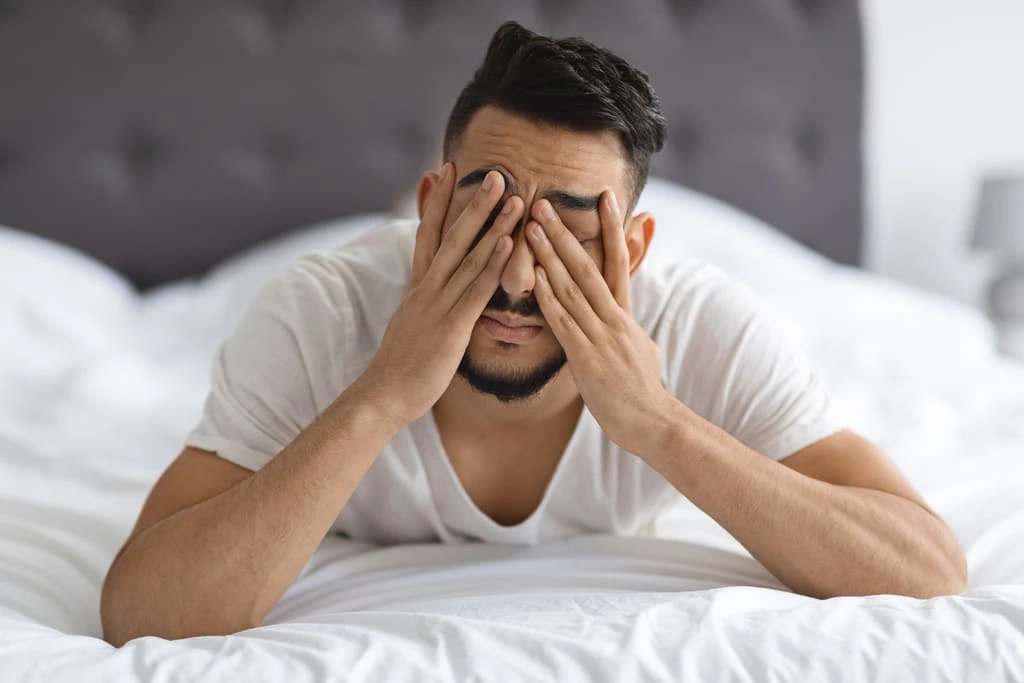What Is a Nocturnal Seizure?
Nocturnal seizures are relatively uncommon and are usually a sign of epilepsy. They happen due to a surge of uncontrolled electrical activity in the brain. This brain activity causes the person to lose control of several vital functions, such as movement and awareness.
There are several different types of epileptic seizures, any of which can occur while the person is asleep.
Some individuals with epilepsy may wake from sleep with aura symptoms preceding a complex partial seizure. The person often has no memory of these episodes the next day.
Tonic-clonic seizures, previously known as grand mal seizures, are the most common type of nocturnal seizures. They are typically shorter than 5 minutes.
The tonic phase of a nocturnal seizure usually causes stiffening of the person’s muscles, which can lead to tongue biting and loss of control of the bowels or bladder. In the clonic phase, the person might make involuntary muscle movements, such as twitching and jerking.
Since epilepsy is often triggered by sleep disruptions, nocturnal seizures may increase the risk of further daytime seizures.
Mini-Seizures While Falling Asleep
Sleeping entails several changes of state, which are referred to as sleep stages. The first sleep stage represents the change from being awake to falling asleep. This change sometimes leads to abnormal brain activity that triggers seizures in individuals with epilepsy. Therefore, some mini-seizures occur while the person is falling asleep.
Research shows that most nocturnal seizures occur between 5 AM and 6 AM, while seizures in the first two hours of sleep are the most uncommon. However, not every person is the same, and people have different sleep schedules.
Nocturnal Epilepsy Meaning
Epilepsy causes abnormal electrical activity between the brain cells and the nerves, muscles, and other body parts. When the electrical signals in the brain send too few or too many messages, the result is a seizure.
Seizures during sleep can be associated with various forms of epilepsy. However, certain types of epilepsy only cause night-time seizures and therefore fall under the nocturnal epilepsy umbrella. Most of these conditions start in childhood.
Common forms of epilepsy associated with nocturnal seizures include the following:

- Tonic-clonic seizures
- Juvenile myoclonic epilepsy
- Benign rolandic epilepsy
- Nocturnal frontal lobe epilepsy
- Landau-Kleffner syndrome
- Electrical status epilepticus
- Frontal lobe epilepsy
Symptoms of Nocturnal Seizures
Since nocturnal seizures occur while the person is asleep, their signs and symptoms are hard to identify. Many individuals with nocturnal seizures are not aware that they have them.
Common symptoms of nocturnal seizures include the following:
- Involuntary movements (stiff arms, jerking, twitching, falling out of bed)
- Making unusual noises (crying out, screaming, grunting)
- Loss of bladder control and bed-wetting
- Tongue biting
- Bruises upon waking
After a nocturnal seizure, the person may be confused, drowsy, and fatigued.
Causes of Nocturnal Seizures
Various types of epilepsy can cause nocturnal seizures.
Potential factors that cause seizures or increase the risk of them include the following:
- Genetics and family history of epileptic seizures
- Traumatic head injuries
- Brain infections
- High fever
- Sleep disorders
- Age (individuals over 40 are at a higher risk of seizures)
- Tumours, stroke, or blood vessel malformation

Some lifestyle habits can also potentially increase the risk of seizures, including alcohol or drug abuse.
Diagnosing Nocturnal Seizures
The most effective way for your doctor to diagnose nocturnal seizures is by performing electroencephalography (EEG). This test allows medical experts to monitor any abnormalities that happen in the electrical activity in the brain. EEG is a painless procedure that involves applying tiny electrodes to the scalp. These electrodes are connected to small wires that can track the person’s brain activity while awake or asleep.
Furthermore, people with nocturnal seizures might need to stay in the hospital overnight for a sleep study. In these studies, the doctor monitors the electrical activity in the brain while asleep. After the medical team establishes a diagnosis, they may perform additional brain imaging to determine which brain areas are affected by the seizures. This usually includes magnetic resonance imaging (MRI) and computer tomography (CT) scans.
Nocturnal Seizures in Children
In most cases, nocturnal epileptic seizures start occurring in childhood. Potential triggers for seizures during sleep in childhood include stress, lack of sleep, and specific sounds.
Signs of nocturnal seizures in children are the following:
- Unusual sleeping positions
- Involuntary movements of the arms, legs, pelvis, and shoulders
- Convulsions
- Blinking
- Stiffening of the body
- Noises, such as screaming, laughing, or crying out
The most effective way to control and monitor nocturnal seizures in children is using an early warning system. These systems typically involve a detection and alarm device which can transmit an alarm upon detecting a seizure. This way, parents can notice their child’s seizures, prevent potentially unsafe situations, and access adequate aid.
Reliable seizure-detecting systems are a crucial tool that enables restful nights for children with nocturnal seizures and their caregivers.
Treatment and Prevention of Nocturnal Seizures
When nocturnal seizures are left untreated, they can put the individual’s health in danger. Frequent nocturnal seizures can also make the affected individual prone to mechanical injuries.
Nocturnal epileptical seizures are usually treatable and possible to control. By controlling their seizures, people with epilepsy can avoid various complications and improve their quality of life. Possible treatments and ways to prevent seizures include the following:
- Anti-epileptic medications
- Avoiding potential triggers, such as sleep deprivation, flashing lights, and alcohol or drug abuse
- Maintaining healthy dietary habits, such as ketogenic or low-carbohydrate diet
- Neuromodulation techniques (vagus nerve stimulation, deep brain stimulation, or a surgical implant sending electrical impulses to the brain)
- Removing furniture and sharp objects away from the bed
- Placing a safety mat on the floor near the bed
- Using a seizure monitor
Managing nocturnal seizures can be difficult for the individual and their family members. With the right support and treatment, managing nocturnal seizures can be easier and improve overall well-being.
Another option is to work alongside a professional waking night carer who will ensure the safety of the individual. Leaf Complex Care offers tailored waking night care services for individuals with epilepsy.
Importance of Waking Night Home Care in Nocturnal Seizures
Waking night home carers stay alert throughout the night to ensure the person they support is safe, and their needs are met. In case of a nocturnal seizure, they are here to prevent any incidents leading to mechanical trauma, such as head injuries.
Waking night carers are trained to handle all the delicate aspects of nocturnal seizures. If the person they support experiences a seizure in their sleep, the carer will take key measures to preserve their safety, such as:
- Placing a pillow below their head
- Removing potentially harmful sharp objects near the person
- Putting them on their side for a clear airway
- Timing the seizure
- Prioritising the safety of the individual
- Calling the ER in case of complications
Feel Safe at Night with Leaf Complex Care
At Leaf Complex Care, we provide compassionate support for individuals with nocturnal seizures. Leaf’s waking night care team delivers specialist care and sleep-related services to children and adults with epilepsy in their own homes.
Our trained experts are here to help people with epilepsy get quality sleep and prevent any possible injuries in case of a nocturnal seizure.
We take a humanised, person-centred approach to supporting people with nocturnal seizures. Our team prioritises the privacy, dignity, and personal boundaries of the individuals we serve. This way, we provide peace of mind for every person and their whole family.
If you are searching for a quality care provider for yourself or a loved one with nocturnal seizures, contact Leaf Complex Care. We deliver CQC-regulated waking night care services and proactive support across the UK, with offices in Bristol, Slough, Somerset and the Midlands.
Contact us now, and we will create a tailored care plan catering to your specific needs.


















